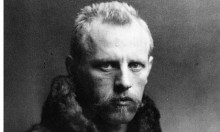On October 10, the world marked the 155th anniversary of Fridtjof Nansen (1861-1930), who was a world-famous polar explorer, public figure, oceanographer, fought to save millions of lives endangered by war, famine and disease, and served as a defender of the defenseless. Nansen is known primarily as an outstanding researcher of the Far North (he was the first to cross – alone! – Greenland on skis, and in 1896, the famous ship Fram, crewed by Nansen and his team, set a world record coming closer to the North Pole than any predecessor). Nansen’s books, in which he spoke about his unique voyages, were read all over the world.
But today, at the beginning of the unforeseeable 3rd millennium, peoples of Earth are rediscovering Nansen’s legacy from a new and unexpected perspective. People respect the prominent Norwegian first and foremost as a passionate humanist, a defender of the defenseless and persecuted, those who suffered from the First World War and the subsequent conflicts in Europe, a savior of hungry, injured, and persecuted, regardless of the country they lived in. Nansen always emphasized: “I am not interested in politics, political quarrels, and power struggles; my job is to preserve and save the lives of people who need it.” And he truly was like that.
Ukrainians owe special gratitude to this noble man. Indeed, according to various estimates, Nansen’s efforts saved more than 6.4 million children and 800,000 adults from a horrible death during the Great Famine of 1921-22 (the data cover both Ukraine and Russia). He opened the dining rooms for victims of the famine, children’s homes for homeless young Ukrainians (they were even called Nansen children’s homes), shelters for the homeless, supplied to Ukraine a large number of agricultural implements and high-value food, while the Nansen Foundation funded establishment of two research farms in Ukraine at the time. Nansen stressed: “Human life is the paramount value for me. Firstly, we need to provide assistance to victims of the famine and help peasants to rebuild their farms so that they may be assured of their future. The second objective is to help raise the cultural level of the country [that is, Ukraine! – Author] which has a great potential. We should help college students to continue their studies, and teachers to keep teaching. Let us remember that for this purpose, we need not only food, but books as well.” One should also remember the famous “Nansen passports,” which made it possible for people in danger of starvation or repression to move to Europe, and thus saved tens of thousands of lives as well.
Nansen was awarded the Nobel Peace Prize in 1922 for “long-term efforts to help the defenseless.” His homeland recognized him as the “Norwegian of the millennium” (and this title still stands, even with contenders such as Roald Amundsen, Thor Heyerdahl, Henrik Ibsen, and Sigrid Undset...). As for the Ukrainians, we are extremely grateful to Nansen. It is because the ability to be grateful is a measure of a people’s or a person’s nobility of mind, as well as because every saved human life is really priceless. He, meanwhile, saved millions.







